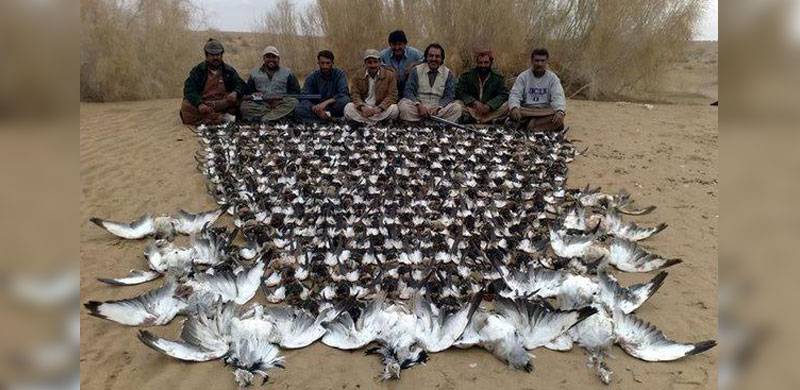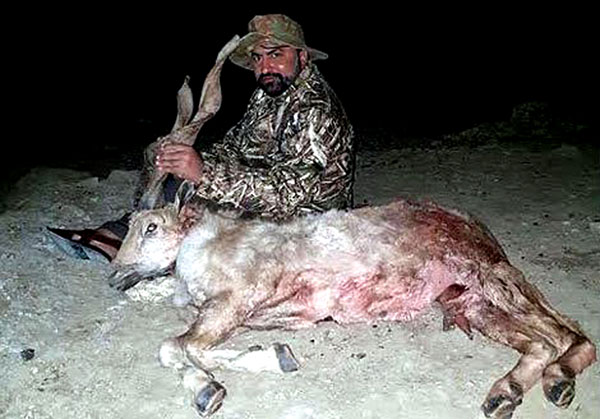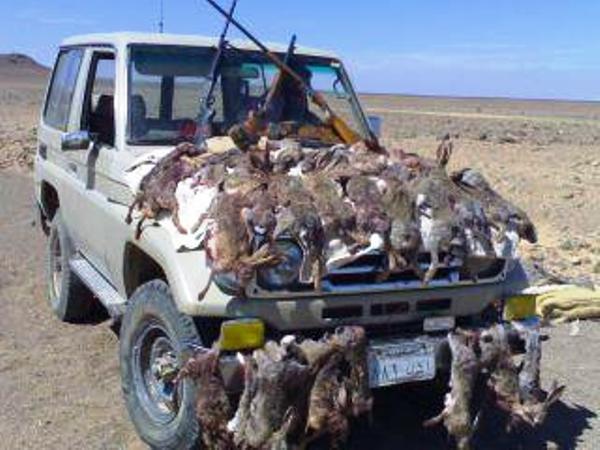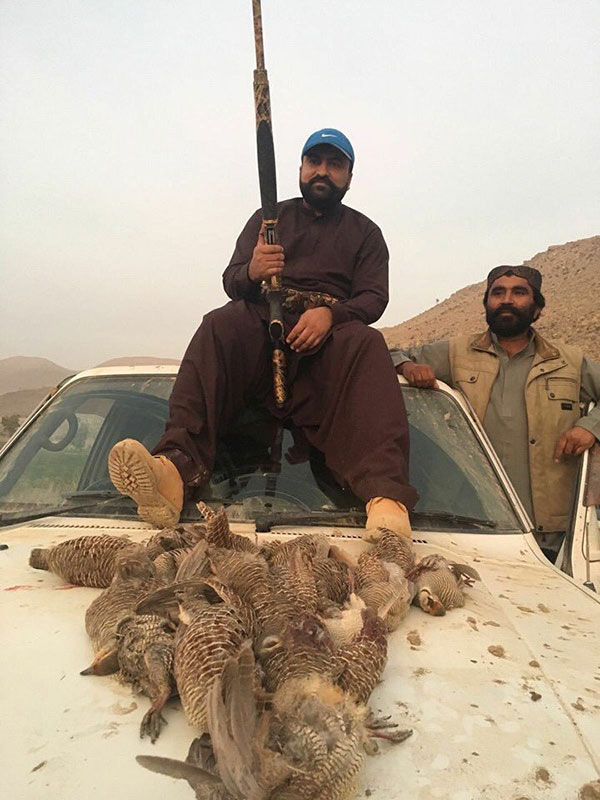
Balochistan is deemed as an attractive wintering terrain and destination for the migratory birds and is thus also a perfect location for hunters every year at the arrival of winter. Therefore, a large number of endangered species like the houbara bustard flying from sub-zero regions of Siberia migrate to Pakistan and other countries.
Recently, the authorities of Forest and Wildlife Department of Balochistan issued a special permit to a Qatari Prince to hunt endangered houbara bustard in Balochistan province. The officials of same department have confirmed to the media that Qatari prince had paid 100,000 dollars to Balochistan Government for legally hunting 100 internationally protected houbara bustards within a span of ten days.
Balochistan being the largest province of Pakistan area-wise is bestowed with a unique landscape, attractive plains and marvelous deserts that not only multiplies its importance but is also an appropriate location for various migratory and native birds.

With the advent of winter, a number of migratory birds, including Sand grouses, pelicans, houbara bustards, pintails, mallards and cranes cover thousands of miles to reach different parts of Pakistan and India.
These guest birds during their journey take short stay in Nushki, Chagai, Washuk, Jhal Magsi, Qila Saifullah, Zhob, Loralai, Lasbela, and other parts of Sindh and Punjab. Sadly, wherever these birds make stopover they are chased and hunted viciously.
Last month an appalling video went viral on social media, showing a group of poachers celebrating hundreds of hunted Sand grouses and francolins packed in sacks somewhere in Nushki district bordering Afghanistan. Such videos have been released and gone viral on social media in the past as well but violators were never brought to the book.

Hunting birds and wild animals is an old tradition throughout the world but in developed countries, hunters strictly abide by hunting terms and conditions. Simultaneously, measures are taken for breeding and conservation of wildlife on scientific basis. Contrary to it, in countries like Pakistan local people as well as foreign dignitaries do not hesitate in slaughtering rare birds and species, brazenly violating law of the land.
For the convenience of Arab royals, Balochistan’s all hunting sites are allotted to different dignitaries of UAE, Qatar and Saudi Arabia. When they arrive to their allotted areas for hunting, the natives who own the land are almost barred to move their lands.

Unfortunately, there is no proper check and balance, neither on Arab royals nor on local hunters, due to which hunters hunt as many birds as they can. In 2014, a dignitary from Saudi Arabia had hunted 2100 houbara bustards in Chagai district within a few week span.
Same year, Balochistan High Court had put a ban on hunting houbara bustards after former Speaker Balochistan Assembly Muhammad Aslam Bothani had filed a petition, challenging the hunting of Hourbara bustards. However, in January 2016, Supreme Court of Pakistan lifted the ban on hunting of houbara bustard.
In the past, many politicians and provincial ministers proudly shared their photos and videos while hunting rare birds and wildlife pretending to be brave and traditional. Such actions on the part of legislators send a wrong message to the society.
Previously, Arab royals used to spend some amount on the development and infrastructure of the areas that they were allotted for hunting. They used to build mosques, hospitals, roads and contribute in water schemes. But now they have learned how to deal and grease the palm of notables and officials to get permits.
In such circumstances, the Forest and Wildlife Department needs to be revamped in accordance with modern requirements so that it could actively work not only for protection of endangered species but also take steps for the conservation and protection of local birds and animals which are also fast getting extinct.
Drought in Balochistan is also badly impacting fauna and flora, and it has been observed by locals and Forest and Wildlife Department that the number of migratory birds have either decreased or they have changed their routes.
According to environmental experts, deforestation, increasing number of hunters and human activities, and degradation of habitats are some motives due to which the number of migratory birds is on decline.
Experts are of the view that birds are crucial for providing ecological benefits because they hunt insects and weed that provide huge benefit to agriculture sectors. Steps are needed to work on maintenance and improvement of wetlands which different migratory birds use as their habitat.
Government ought to assist Forest and Wildlife Department for conducting survey of migratory birds, wild animals and native birds on regular basis beside taking measure for their protection and breeding.
Recently, the authorities of Forest and Wildlife Department of Balochistan issued a special permit to a Qatari Prince to hunt endangered houbara bustard in Balochistan province. The officials of same department have confirmed to the media that Qatari prince had paid 100,000 dollars to Balochistan Government for legally hunting 100 internationally protected houbara bustards within a span of ten days.
Balochistan being the largest province of Pakistan area-wise is bestowed with a unique landscape, attractive plains and marvelous deserts that not only multiplies its importance but is also an appropriate location for various migratory and native birds.

With the advent of winter, a number of migratory birds, including Sand grouses, pelicans, houbara bustards, pintails, mallards and cranes cover thousands of miles to reach different parts of Pakistan and India.
These guest birds during their journey take short stay in Nushki, Chagai, Washuk, Jhal Magsi, Qila Saifullah, Zhob, Loralai, Lasbela, and other parts of Sindh and Punjab. Sadly, wherever these birds make stopover they are chased and hunted viciously.
Last month an appalling video went viral on social media, showing a group of poachers celebrating hundreds of hunted Sand grouses and francolins packed in sacks somewhere in Nushki district bordering Afghanistan. Such videos have been released and gone viral on social media in the past as well but violators were never brought to the book.

Hunting birds and wild animals is an old tradition throughout the world but in developed countries, hunters strictly abide by hunting terms and conditions. Simultaneously, measures are taken for breeding and conservation of wildlife on scientific basis. Contrary to it, in countries like Pakistan local people as well as foreign dignitaries do not hesitate in slaughtering rare birds and species, brazenly violating law of the land.
For the convenience of Arab royals, Balochistan’s all hunting sites are allotted to different dignitaries of UAE, Qatar and Saudi Arabia. When they arrive to their allotted areas for hunting, the natives who own the land are almost barred to move their lands.

Unfortunately, there is no proper check and balance, neither on Arab royals nor on local hunters, due to which hunters hunt as many birds as they can. In 2014, a dignitary from Saudi Arabia had hunted 2100 houbara bustards in Chagai district within a few week span.
Same year, Balochistan High Court had put a ban on hunting houbara bustards after former Speaker Balochistan Assembly Muhammad Aslam Bothani had filed a petition, challenging the hunting of Hourbara bustards. However, in January 2016, Supreme Court of Pakistan lifted the ban on hunting of houbara bustard.
In the past, many politicians and provincial ministers proudly shared their photos and videos while hunting rare birds and wildlife pretending to be brave and traditional. Such actions on the part of legislators send a wrong message to the society.
Previously, Arab royals used to spend some amount on the development and infrastructure of the areas that they were allotted for hunting. They used to build mosques, hospitals, roads and contribute in water schemes. But now they have learned how to deal and grease the palm of notables and officials to get permits.
In such circumstances, the Forest and Wildlife Department needs to be revamped in accordance with modern requirements so that it could actively work not only for protection of endangered species but also take steps for the conservation and protection of local birds and animals which are also fast getting extinct.
Drought in Balochistan is also badly impacting fauna and flora, and it has been observed by locals and Forest and Wildlife Department that the number of migratory birds have either decreased or they have changed their routes.
According to environmental experts, deforestation, increasing number of hunters and human activities, and degradation of habitats are some motives due to which the number of migratory birds is on decline.
Experts are of the view that birds are crucial for providing ecological benefits because they hunt insects and weed that provide huge benefit to agriculture sectors. Steps are needed to work on maintenance and improvement of wetlands which different migratory birds use as their habitat.
Government ought to assist Forest and Wildlife Department for conducting survey of migratory birds, wild animals and native birds on regular basis beside taking measure for their protection and breeding.
